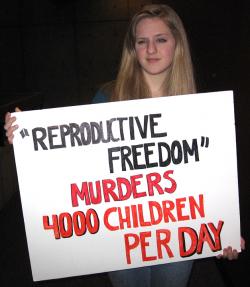 Nicole Jones
Nicole JonesPartial-birth abortion is a procedure that medical science has proven is immensely painful for the unborn child. It is usually performed in the third trimester when the child is fully capable of living outside the womb. The child is completely delivered except for the head. Arms, legs and abdomen are outside the mother’s body. Scissors are jammed into the base of the skull, a tube is inserted and the brain is sucked out. The child receives no anesthesia. No medical reasons exist for a partial-birth abortion. The Eighth Amendment outlaws the use of “cruel and unusual punishments.” The Court should uphold the ban on partial-birth abortion, the cruelest of the abortionist’s punishments for a child’s crime of existing.
A “fetus” enjoys limited rights, but not the most basic of all – the right to life. Many states have laws such as the Illinois Wrongful Death Act, which grants an unborn child the status of “personhood” for specific legal purposes. For instance, if a drunk driver were to hit and kill a pregnant woman, he could be charged with a double homicide, one for the mother, the other for the child. Though state laws like these acknowledge an unborn child’s personhood, the federal government can simultaneously uphold a woman’s “right” to abortion. This presents an obvious problem. If a woman is hit by a car on her way to get an abortion, she could charge the driver with “attempted murder” of her unborn child. After winning the lawsuit for the endangerment of her child, the woman could then walk across the street to the abortion clinic and kill the child herself.
Many Americans view abortion as a life and death issue. The debate has always centered on defining what a fundamental right is. While abortion rights’ rhetoric claims that abortion is guaranteed under a “right to privacy” supposedly imbedded in the 14th Amendment, anti-abortion advocates point to Thomas Jefferson’s rights of “Life, Liberty and the pursuit of Happiness,” with an emphasis on “life” as the ancestral right of all. Much like the 1960s debate over the constitutionality of segregation, abortion necessitates passionate protesting and divisive debate because both sides must recognize that this issue is bigger than a right to “privacy.” It’s more than a just women’s right issue. It’s human rights issue of life and death.

